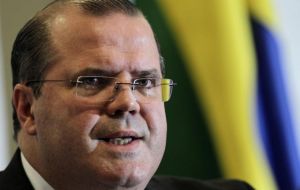MercoPress. South Atlantic News Agency
Brazil January inflation spike triggers concern for the government and investors
 Alexandre Tombini: “this year’s inflation will be lower than that of 2012”
Alexandre Tombini: “this year’s inflation will be lower than that of 2012” Brazilian inflation in January climbed to 0.86%, the highest for the month in the last ten years, according to the country’s stats office, IBGE. Inflation in December was 0.79%, ending the twelve months of last year at 5.82% which was in the target range with a ceiling of 6.5%.
“Short term inflation is a concern, but we are not facing a situation of inflationary spiral. Our expectations are that it will continue pressing on prices during the first half of the year, finishing at 6% for the accumulated twelve months”, anticipated Central bank president Alexandre Tombini speaking with O’Globo.
Tombini insisted that the January spike would break the government’s 6.5% target for 2013. He anticipated that inflation in February could drop to half January’s index mainly because of the coming into effect the substantial rebates for power consumption: 18% for homes and 32% for industry, agriculture and business.
January’s 0.86% was the highest since January 2003 and above all monthly rates since 2005. In the last twelve months to January 2013, inflation was 6.15%.
“Our expectations are that this year’s inflation will be lower than that of 2012” underlined Tombini.
Meanwhile with the Brazilian currency Real last week hovering between 1.95 to 1.97 to the US dollar, Finance minister Guido Mantega said the government would allow the Real to rise another 5%. But he also pointed out that it will curb gains in the currency if it reaches 1.85 per dollar.
Markets are expecting policy makers to let the Real strengthen to contain the rise in consumer prices.
Mantega said that the government may increase taxes on foreign inflows or buy dollars to thwart currency speculation and in a statement to Bloomberg insisted that “exchange-rate policy hasn’t changed and Brazil won’t allow speculative appreciation of the Real.
Brazil pushed the Real down 9% in 2012 and 11% in 2011 as Mantega said major economies were debasing currencies such as the dollar while driving up those of developing nations.
At the end of January the Real traded at a level stronger than 2 per dollar for the first time since July as Brazil took steps including exempting foreigners from a tax on real-estate funds traded on the stock exchange, encouraging speculation that inflows would sustain the currency.
Policy makers held the target lending rate at a record low 7.25% last month for a second straight meeting after the slowest two years of economic expansion in a decade. The central bank has lowered benchmark borrowing costs by 5.25 percentage points since August 2011 in the most aggressive cuts among Group of 20 nations.




Top Comments
Disclaimer & comment rules-

-

Read all commentsInflation in December was 0.79%, ending the twelve months of last year at 5.82% which was in the target range with a ceiling of 6.5%.
Feb 13th, 2013 - 11:42 am 0Tombini insisted that the January spike would break the government’s 6.5% target for 2013.
Our expectations are that it will continue pressing on prices during the first half of the year, finishing at 6% for the accumulated twelve months”,
Inflation in December was 0.79%, ending the twelve months of last year at 5.82% which was in the target range with a ceiling of 6.5%.(for 2012)
“Our expectations are that this year’s inflation will be lower than that of 2012” underlined Tombini.
Given these statements HOW is that going to happen? Does Tombibi ever READ his own guff, it seems not?
I wonder if he is rehearing this drivel so that he can take Mantega's job becuase he is a master at lies and decit.
http://en.mercopress.com/2013/02/11/brazil-january-inflation-spike-triggers-concern-for-the-government-and-investors#comment216756: I'm surprised that you can find time to comment on the Brazilian economy. Wouldn't your time be better spent fixing the broken electoral system of the UK so that the scum cannot gain control?
Feb 13th, 2013 - 02:00 pm 0Commenting for this story is now closed.
If you have a Facebook account, become a fan and comment on our Facebook Page!